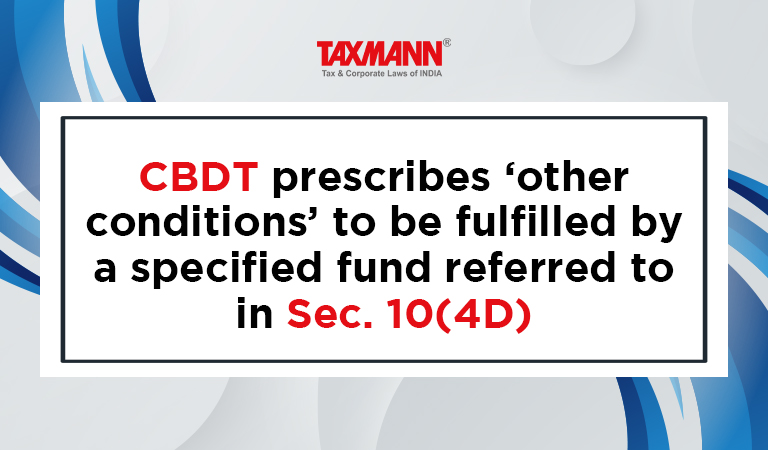CBDT prescribes ‘other conditions’ to be fulfilled by a specified fund referred to in Sec. 10(4D)
- Blog|News|Income Tax|
- 2 Min Read
- By Taxmann
- |
- Last Updated on 20 June, 2022

Notification No. 64/2022, dated 16-06-2022
Section 10(4D) provides the exemption in respect of certain incomes of the specified fund. The specified fund is defined under clause (c) of the Explanation to section 10(4D) to mean:
-
- A Category-III Alternative Investment Fund (AIF) located in any International Financial Services Centre (IFSC); or
- An investment division of an offshore banking unit which has been granted a certificate of registration as a Category-I foreign portfolio investor (FPI)
A specified fund, being a Category-III AIF located in IFSC, is allowed exemption under section 10(4D) subject to the condition that its all the units (other than unit held by a sponsor or manager) are held by non-residents.
The Finance Act 2022 with effect from the assessment year 2023-24 has inserted a proviso to the above definition. It has been provided that if a non-resident unit holder(s) becomes resident under clause (1) or clause (1A) of section 6 in any previous year subsequent to the year in which units were issued to him, the exemption shall continue to be available to specified fund provided such unitholders do not hold more than 5% of the total units issued by the specified fund.
Said proviso also provides that such specified shall also be required to fulfil ‘other conditions’ as may be prescribed by the board. The Central Board of Direct Taxes (CBDT) has notified a new Rule 21AIA prescribing such ‘other conditions’. Said Rule 21AIA lists down the following conditions:
1) Unit holder of the specified fund, other than the sponsor or manager of such fund, who becomes a resident under clause (1) or clause (1A) of section 6 during any previous year subsequent to the previous year in which such unit or units were issued, shall cease to be a unit holder of such specified fund within 3 months from the end of the previous year in which he becomes a resident.
2) The specified fund shall maintain the following documents in respect of its unit holders:
-
-
-
- Name of the unit holder;
- Tax identification number of the unit holder in the country of residence at the time the units were issued;
- Permanent account number, if available;
- Total number of units held;
- Total value of units held
- Whether unit holder is a sponsor or a manager;
- The previous year in which the unit holder became resident and
- Date of exit from specified fund.
-
-
3) The specified fund shall furnish information in respect of units held by residents in the annual statement of exempt income in Form No. 10-IG.
4) The income attributable to units held by non-resident (not being the permanent establishment of a nonresident in India) in a specified fund shall not be exempt under section 10(4D) unless the specified fund furnish Form no. 10-IG.
The CBDT has also amended the existing Rules 21AI, 21AJ, 21AJA, and 21AJAA providing mandatory furnishing of Forms 10-IH, 10-IK, 10-IL, and 10-IK to become eligible to claim an exemption under sections 115AD and 10(4D).
Click Here To Read The Full Notification
Disclaimer: The content/information published on the website is only for general information of the user and shall not be construed as legal advice. While the Taxmann has exercised reasonable efforts to ensure the veracity of information/content published, Taxmann shall be under no liability in any manner whatsoever for incorrect information, if any.

Taxmann Publications has a dedicated in-house Research & Editorial Team. This team consists of a team of Chartered Accountants, Company Secretaries, and Lawyers. This team works under the guidance and supervision of editor-in-chief Mr Rakesh Bhargava.
The Research and Editorial Team is responsible for developing reliable and accurate content for the readers. The team follows the six-sigma approach to achieve the benchmark of zero error in its publications and research platforms. The team ensures that the following publication guidelines are thoroughly followed while developing the content:
- The statutory material is obtained only from the authorized and reliable sources
- All the latest developments in the judicial and legislative fields are covered
- Prepare the analytical write-ups on current, controversial, and important issues to help the readers to understand the concept and its implications
- Every content published by Taxmann is complete, accurate and lucid
- All evidence-based statements are supported with proper reference to Section, Circular No., Notification No. or citations
- The golden rules of grammar, style and consistency are thoroughly followed
- Font and size that’s easy to read and remain consistent across all imprint and digital publications are applied



 CA | CS | CMA
CA | CS | CMA
